5 Audre Lorde Books to Add to Your Reading List
The words of the self-described "Black, lesbian, mother, warrior, poet" are essential.

Photo: Courtesy of Penguin Classics
The daughter of Caribbean immigrants, Audre Lorde was born in 1934 in Harlem. Over the next sixty years, she became an undeniable icon, a self-styled "Black, lesbian, mother, warrior, poet" synonymous with intersectional feminism. Through her activism and work—speeches, essays, poems, journals—she was a tireless revolutionary in the fight for women's rights. She fought especially hard to create space for Black and queer women in that movement, to "bridge some of those differences between us, for it is not difference which immobilizes us, but silence. And there are so many silences to be broken," she wrote in "The Transformation of Silence into Language and Action."
Her books—among them Sister Outsider, Zami: A New Spelling of My Name, and her Collected Poems—all sought to pierce "the tyrannies of silence." One of her greatest subjects was crumbling the twin pillars of racism and sexism: "Within this country, where racial difference creates a constant, if unspoken, distortion of vision, Black women have on one hand always been highly visible, and so, on the other hand, have been rendered invisible through the depersonalization of racism."
While her writing was blisteringly political, it was also deeply personal. In 1978, Lorde detected a lump in her breast, a discovery that led, eventually, to a mastectomy. She had a gift, however, of turning immense vulnerability into strength, and rather than shy away from discussing this diagnosis and the way it physically altered her body, she campaigned—most notably in her 1980 work The Cancer Journals—to eliminate the shame of breast cancer and amputation. She would revisit this theme in her essay collection A Burst of Light, published in 1988, just a few years before her death in 1992 due to complications of liver cancer.
In the arenas of race and sex, she was fearless. "Afraid is a country where they issue us passports at birth and hope we never seek citizenship in any other country," she wrote in A Burst of Light. She was utterly fearless, and finding where to start in one's quest to read her work can be a daunting task. The following five books all work as introductions to Lorde's brilliance. Let them be passports to a country in which women of all races love each other and themselves.
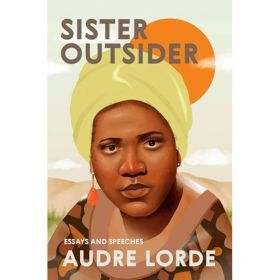 1. Sister Outsider: Essays and Speeches
1. Sister Outsider: Essays and Speeches
Containing some of Lorde's most powerful prose, this mountain-moving compendium of speeches and essays from 1971 feels just as immediate as it did when it first dropped. Inside, you'll find impassioned pieces like "The Transformation of Silence into Language and Action," "Uses of the Erotic," and "Poetry is Not a Luxury." Every line here is essential—for activists, for writers, for all women. If you're looking for a place to start engaging in Lorde's work, this is it. Shop Now
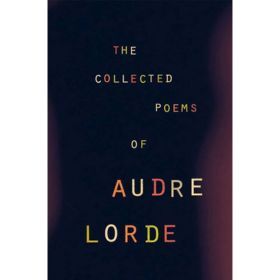 2. The Collected Poems of Audre Lorde
2. The Collected Poems of Audre Lorde
Lorde once wrote that "it is through poetry that we give name to those ideas which are—until the poem—nameless and formless, about to be birthed, but already felt." There are no better examples of this than in the author's own clear-eyed verse, which spans twenty-five years of her career. In "Coal," from her very first collection, she compares her identity to a diamond: "I am black because I come from the earth's inside/Take my word for jewel in your open light." In "Who Said It Was Simple," from her National Book Award-winning work From a Land Where Other People Live, she excoriates white feminism: "the women rally before they march/discussing the problematic girls/they hire to make them free." Her searing poems will make you understand why Lorde identified as a poet first and foremost. Shop Now
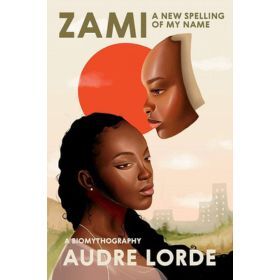 3. Zami: A New Spelling of My Name - A Biomythography
3. Zami: A New Spelling of My Name - A Biomythography
In our list of 100 life-changing LGBTQ books, bestselling author Nicole Dennis-Benn wrote that, upon reading Zami, "I realized I wasn't alone as a Black immigrant lesbian—I, too, could be as courageous and loud with my truths; I could defy a legacy of silence through the power of the written word." Here, Lorde turns her life—her childhood in 1930s, her romantic relationships with other women—into the mythological tale it certainly is, telling her story with Homeric grandeur. Shop Now
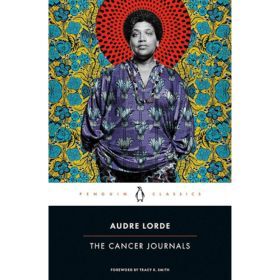 4. The Cancer Journals
4. The Cancer Journals
Originally published forty years ago, this diaristic memoir chronicling her battle with breast cancer and a subsequent mastectomy, like so much of Lorde's work, seeks to puncture the silence. In this case, she dispels the sense of shame many women feel after having their breasts removed. As the poet Tracy K. Smith writes in the introduction to the Penguin Classics edition (out in October), The Cancer Journals "bears witness to Lorde's radical reenvisioning of self, body, and society through the experience of illness, fear, pain, anger, and dawning clarity." Shop Now
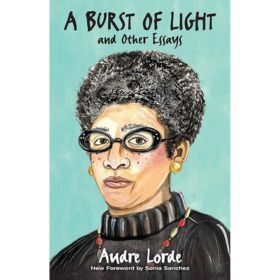 5. A Burst of Light: and Other Essays
5. A Burst of Light: and Other Essays
In 1984, when Lorde was fifty, she was diagnosed with liver cancer, metastasized from the breast cancer. Bravely, she decided to continue with her planned trip to Berlin to teach and observe the community of young Afro-Germans. In this collection, we are made privy to the journal she kept during that time, with entries on everything from the importance of community, her legacy, her daughter's graduation from Harvard, and how Germany wrestles with its own past. Heartbreakingly, and undoubtedly profound, Lorde's sense of her own mortality pulses on every page: "I want to write down everything I know about being afraid, but I'd probably never have enough time to write anything else." A Burst of Light is an incredible coda to an incredible life. Shop Now



